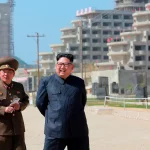by Andy Khong
HONG Xiuquan claimed to be the younger brother of Jesus Christ and believed that he was chosen by God to establish a Heavenly Kingdom (Heavenly Dynasty – a Christian theocratic absolute monarchy) on Earth that would transform China into a utopian society. His movement, known as the Taiping Rebellion (1850-1864), was one of the bloodiest wars in human history, resulting in the estimated deaths of 20-30 million people Chinese Naming System – First Word: HONG = surname/family name; Second & Third Word: Xiu + Quan = Given Name; ~ Taiping = means “Great Peace”].
HONG Xiuquan was born of Hakka* descent on 1 January 1814 in Huadu, Guangdong (Canton) province, China, and was a scholar who failed the imperial examinations four times, which were the traditional route to government service during the Qing dynasty (the exams only accepted the top 1% of all candidates who passed into the Imperial Service). [*Hakka literally meaning ‘guest families’, are an ethnic sub-group of the Han Chinese].
In 1843, HONG Xiuquan experienced a series of visions that he interpreted as messages from God, in which he believed he was appointed as the younger brother of Jesus Christ and given a mission to rid China of the corrupt Qing` dynasty and establish a Heavenly Kingdom based on his unique interpretation of Christianity mixed with some indigenous Chinese beliefs [`The Qing Dynasty (1644-1912) which was ruling China at that time was intensely disliked by the local population, being regarded as ‘outsiders’. Qing Emperors were Manchus from Manchuria in the north-east, and were not regarded as ethnically Han Chinese in those days].
HONG Xiuquan’s visions and messages from God and Jesus, as he claimed, formed the basis of his religious beliefs and the ideology of the Taiping Heavenly Kingdom. According to his own accounts, HONG Xiuquan experienced a series of visions that he interpreted as divine revelations, which shaped his religious convictions and inspired him to rebel against the Qing dynasty. The details of his visions are primarily known from his autobiography, “The Story of How I Established the Heavenly Kingdom“, which was written with the help of his followers.
In his visions, HONG Xiuquan saw himself being taken to heaven, where he met an old man who he identified as God, and a young man who he identified as Jesus Christ. He claimed that God and Jesus told him that he was the younger brother of Jesus and that he was chosen by God to establish a Heavenly Kingdom on Earth. HONG Xiuquan believed that he was tasked with eradicating the “devil worshipers,” which he associated with the Qing dynasty, and restoring the true teachings of Christianity, as he interpreted them, in China.
In his visions, HONG Xiuquan also claimed to receive divine guidance on various religious and social doctrines that would form the foundation of the Taiping Heavenly Kingdom. These included beliefs such as the worship of one God, the abolition of Confucianism and ancestral worship, the promotion of communal property, strict moral codes that prohibited activities such as gambling, opium use, and prostitution, and the establishment of gender equality with men and women holding equal roles and responsibilities in society (plus banning polygamy, and foot binding in women).
HONG Xiuquan’s visions and messages from God and Jesus were deeply personal and had a profound impact on his religious beliefs and the formation of his revolutionary ideology. These visions provided him with a sense of divine mandate and purpose, which he used to rally his followers and lead the Taiping Rebellion against the Qing dynasty.
HONG Xiuquan gained a following, and his movement grew rapidly, attracting disaffected peasants, labourers, and other marginalised groups who were discontent with the Qing dynasty’s rule. The Taiping Rebellion was characterised by its radical social and political agenda, including the promotion of communal property, gender equality, and strict moral codes. HONG Xiuquan proclaimed himself as the Heavenly King of the Taiping Heavenly Kingdom, and led his followers in a violent uprising against the Qing dynasty. The Heavenly Kingdom ended up ruling over large portions of southern China (1850-1864).
Despite initial successes, including the capture of Nanjing in 1853 and the establishment of the Taiping capital there, the rebellion faced internal conflicts, external pressures from Qing forces, and challenges in governance. The Qing government also received some support from Western powers, including the French and British with their superior firepower and military strategy during the Taiping Rebellion.
On 1st June 1864, HONG Xiuquan died, and the Taiping Rebellion eventually collapsed, resulting in the deaths of an estimated 20-30 million people, making it one of the deadliest conflicts in human history. Despite its ultimate failure, the Taiping Rebellion had a significant impact on Chinese history, and its legacy is still debated by historians and scholars today.
What is the Taiping Bible?
The “Taiping Bible” refers to a religious text called the “Xinjing” or “The New Testament” that was written by HONG Xiuquan. The “Xinjing” is also known as the “Taiping Jing” or the “Holy Book of Great Peace.”
The Taiping Bible contains many references to the Old Testament, including stories, characters, and teachings from the Hebrew Bible, such as the Ten Commandments, the story of Adam and Eve, and the story of Moses.
It is a unique religious text that reflects HONG Xiuquan’s personal interpretations of Christianity, mixed with his own spiritual experiences and beliefs. It contains a collection of teachings, prophecies, and regulations that HONG Xiuquan claimed were revealed to him by God and Jesus in his visions. The “Xinjing” served as the foundational scripture of the Taiping Heavenly Kingdom and was considered the authoritative text for the Taiping followers, offering HONG Xiuquan’s vision of a utopian society based on his interpretation of Christianity and Chinese cultural elements. It includes teachings on the worship of one God, the rejection of Confucianism and ancestral worship, the promotion of communal property, gender equality, and strict moral codes. It also includes prophecies about the imminent fall of the Qing dynasty and the eventual establishment of the Taiping Heavenly Kingdom as the one true kingdom on Earth.
The “Xinjing” was written in a style that resembles the format of the Christian Bible, with chapters, verses, and sections. It incorporates Christian terminology and concepts, but also includes elements from traditional Chinese culture and HONG Xiuquan’s own revelations and visions. HONG’s translation and adaptation emphasised the wrath of God from the Old Testament who demanded worship and obedience, with little emphasis on the ideas of kindness, forgiveness, and redemption from the New Testament.

HONG Xiuquan
How did HONG Xiuquan die?
HONG Xiuquan died on 1st June 1864, in his capital city of Nanjing, which was the capital of the Taiping Heavenly Kingdom during the Taiping Rebellion (Nanjing was renamed “Tianjing”, meaning ‘Heavenly Capital’ during HONG’s ascension to the throne, being the New Jerusalem). The exact cause of his death is not entirely clear and remains a subject of historical debate.
There are several different accounts and theories regarding HONG Xiuquan’s death. One account suggests that he died from complications related to a long-standing opium addiction, which he developed during his later years. It is said that HONG Xiuquan became addicted to opium as a way to cope with the stresses of leading a rebellion and governing a kingdom. Another theory is that he died from natural causes, food poisoning, or from injuries sustained during the ongoing conflict with Qing forces.
There are also accounts that suggest HONG Xiuquan may have been assassinated by his own followers. Some sources claim that there were internal power struggles and conflicts within the leadership of the Taiping Heavenly Kingdom, and that HONG Xiuquan’s death may have been the result of a plot or conspiracy by his own generals or followers who were dissatisfied with his leadership or sought to gain power. The exact circumstances of HONG Xiuquan’s death remain unclear and are the subject of ongoing historical research and speculation. However, it is generally agreed that he died in Nanjing, the capital of the Taiping Heavenly Kingdom on 1 June 1864, marking the end of his leadership of the Taiping Rebellion.

Taiping Heavenly Kingdom Banner.
What happened to HONG Xiuquan’s followers after the Heavenly Kingdom collapsed?
After the collapse of the Taiping Heavenly Kingdom, which occurred in 1864 after the death of HONG Xiuquan, the fate of his followers varied. The fall of the Taiping Rebellion resulted in widespread violence, destruction, and social upheaval in China, and many of HONG Xiuquan’s followers faced dire consequences.
- Some followers were killed or executed: Many of HONG Xiuquan’s followers were killed or executed during and after the fall of the Taiping Heavenly Kingdom. Qing forces, who had been engaged in a prolonged conflict with the Taiping rebels, sought revenge against the rebels and those associated with the Taiping Rebellion. Thousands of Taiping followers were executed, often in brutal ways, as the Qing dynasty sought to eliminate the remnants of the Taiping movement.
- Some followers surrendered and were imprisoned: Some of HONG Xiuquan’s followers surrendered to Qing forces after the fall of the Taiping Heavenly Kingdom and were taken prisoners. They faced imprisonment, harsh treatment, and often endured forced labor or other forms of punishment as captives of the Qing government.
- Some followers went into hiding: Following the collapse of the Taiping Heavenly Kingdom, some of HONG Xiuquan’s followers went into hiding to escape persecution. They tried to evade capture by Qing forces and sought refuge in remote areas or underground movements, while continuing to hold on to their beliefs and practices in secret.
- Some followers returned to their original communities: Not all of HONG Xiuquan’s followers were killed, imprisoned, or went into hiding. Some followers returned to their original communities or joined other social movements, seeking to rebuild their lives after the collapse of the Taiping Rebellion. They may have abandoned their Taiping beliefs or integrated them into their existing religious or cultural practices.
- Some followers joined other rebellions or uprisings: Some of HONG Xiuquan’s followers joined other rebellions or uprisings that occurred in China after the collapse of the Taiping Heavenly Kingdom. They may have sought to continue the fight against the Qing dynasty or pursue other revolutionary or reformist causes.
Overall, the fate of HONG Xiuquan’s followers after the collapse of the Taiping Heavenly Kingdom was varied and often tragic. Many faced violence, persecution, and social upheaval, while others sought to rebuild their lives or continue their revolutionary activities in different ways. The Taiping Rebellion left a lasting impact on Chinese history and society, and its aftermath had significant consequences for HONG Xiuquan’s followers and their descendants.

Heavenly King’s Throne, Palace of the Heavenly Kingdom in Nanjing.
Although it is estimated that HONG Xiuquan’s movement left 20-30 million dead in its wake; a recent Chinese study estimates up to 70 million deaths mainly due to plague and famine. The widespread unrest stirred by HONG Xiuquan eventually led to Dr SUN Yat-Sen’s (father of modern China) overthrow of the Manchus (Qing Dynasty) in 1911-12.
HONG Xiuquan demonstrated that modern-day peasant rebellion is possible. The Communists under MAO Zedong by and large respected HONG Xiuquan and his resistance as a genuine peasant uprising that anticipated their own. China experiences numerous riots each year. It is of no big surprise that the Chinese Communist Party (CCP) see dangers all over, and scan the horizon ready for a crackdown for any uprising like the one which brought them to power.

HONG Xiuquan’s Former Residence Memorial Museum.
Today you can find HONG Xiuquan’s Former Residence Memorial Museum in the Guanlubu Village, Huadu District, Guangzhou (Canton) which was established and opened to commemorate HONG Xiuquan, and the Taiping Rebellion.
China has reopened its border to foreign tourists since mid-March 2023, three years since the Covid pandemic. Stay tuned as YPT will be planning tours to China in the coming months. Check out YPT China Tours.





